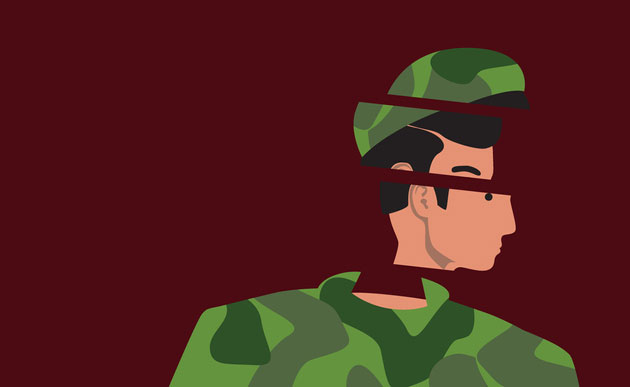
If you’re a veteran or active-duty service member eyeballing a career in social work, you have a lot to feel confident about. You’ve likely been separated from loved ones, built bonds with people from all walks of life, and have seen or experienced the long-lasting effects of trauma. You know adversity. That fact alone can help you navigate this field with compassion and resourcefulness.
But what if that’s not entirely true? Helping people through poverty, abuse, and mental health crises is a big responsibility. Who are you to take it on? Maybe you should pursue a career more in-line with your MOS. Besides, even if you have military social work experience, civilian life is very different from life on post.
Don’t let those negative thoughts keep you away from a rewarding career in social work. You’re not giving yourself enough credit.
According to Dr. Sean St. Jean of King University’s Master of Social Work (MSW) program, social workers and social work students alike often question their own abilities. “Many of us, especially when we go into graduate work, become terrified about having to put our skills on display,” he says. “We become painfully aware of how ill-equipped we actually are to help other human beings.”
In an interview with MilitarySupportiveColleges.com, Dr. St. Jean shared insights into why these feelings of doubt are so detrimental, how they develop, and what he and his colleagues at King University do to help students overcome them.
 One of a social worker’s biggest challenges is taking classroom knowledge into the real world. Dr. Sean St. Jean, MSW, has spent over a decade perfecting that art. After earning his PhD in Social Work from The University of British Columbia, he worked in child protection, Aboriginal Family, and mental health services. Now, his specialty is counseling professionals like first responders dealing with burnout and on-the-job trauma. At King University, Dr. St. Jean is both a professor and the Director of the school’s dynamic fieldwork program.
One of a social worker’s biggest challenges is taking classroom knowledge into the real world. Dr. Sean St. Jean, MSW, has spent over a decade perfecting that art. After earning his PhD in Social Work from The University of British Columbia, he worked in child protection, Aboriginal Family, and mental health services. Now, his specialty is counseling professionals like first responders dealing with burnout and on-the-job trauma. At King University, Dr. St. Jean is both a professor and the Director of the school’s dynamic fieldwork program.
Imposter Syndrome: The Illusion of Inability
In the complex field of social work, self-doubt often takes the form of its bigger, scarier sibling: imposter syndrome. A person experiencing imposter syndrome doesn’t just think they can’t do something. They think that no matter how much they learn, train, and experience, they’ll never be prepared.
While this may sound like a severe and rare form of anxiety, researchers say that up to 82% of people experience imposter syndrome at some point in their lives. In every stage of their careers, social workers must be prepared to face this uncertainty head on.
Imposter Syndrome in Social Work Education
When imposter syndrome rears its ugly head in the classroom, it can lead students to miss important learning opportunities. Dr. St. Jean saw this happen when he was a bright-eyed social work student himself:
“When I was going through my Master’s program, there was a thing called a fishbowl exercise in one of the classes. That’s when somebody acts as a client and a student acts as the clinician. All of the students and the professor are watching. It’s sort of like roleplay. It terrified all of us.”
Thinking on your feet is vital to social work. So as nerve-wracking as a fishbowl exercise sounds, these types of hands-on exercises are an important part of the learning process. But when it came time for Dr. St. Jean’s class’s fishbowl exercise, attendance was slim:
“That day, like half the class was missing. They all called in sick. That experience really speaks to the idea that many students feel this very strong sense of, ‘What am I doing? I don’t have the skills. I’m not qualified to speak to this person.’”
To an objective outsider, this might seem a little ridiculous. Students aren’t supposed to have all the answers. They’re supposed to make mistakes and learn from them. But to someone experiencing imposter syndrome, a mistake isn’t a learning opportunity. It’s a confirmation of their deepest, darkest fear: that they don’t have what it takes and never will.
Unique Challenges for Veterans Transitioning Into Social Work
Veterans and service members entering social work face many of the same challenges as their civilian peers. Unfortunately though, they often have a lot more to deal with, too.

Upon separation, many veterans:
- Second-guess their academic abilities. Only about >7% of enlisted personnel have a bachelor’s degree. Despite earning GI Bill benefits, veterans who consider becoming social workers often see college as a path they’re not equipped to follow.
- Have trouble building a structured routine. In the military, everyday life is structured by strict rules and responsibilities. Veterans frequently need to adjust to the unstructured quality of civilian life. The potential disorder of social work can seem even more intimidating.
- Feel disconnected from others. Combat veterans often have experiences others just can’t understand. This feeling of isolation can get in the way of working with fellow students and working with internship supervisors.
- Feel left behind by the changing job market. With the breakneck speed of technological developments, even veterans who have jobs to return to must acquire new skills before integrating back into the workforce.
Military supportive social work programs across the country are devoted to overcoming these obstacles. Through online programs, veterans can achieve their goals on their own time while adjusting to civilian life. Many military supportive colleges also offer the Yellow Ribbon program which helps veterans pay for education costs not covered by the GI Bill. Whatever your misgivings are, there’s likely a program that can help you through them.
Imposter Syndrome in Social Work Careers
Imposter syndrome isn’t limited to students. In the military, even the most outwardly confident officers experience it. They see their successes as fake or undeserved. In their minds, they’re one mistake away from being exposed as frauds.

In social work, Dr. St. Jean says imposter syndrome is particularly common amongst entry-level professionals transitioning into higher-level roles:
“At the graduate level, you’re getting into more therapeutic work. You’re the one with all the right answers telling people what to do. That could be a really hard shift for students who are used to saying, ‘Fill out this form and apply for this thing.’ This is another reason why imposter syndrome is so tough for young social workers. If clients follow your directions and it doesn’t work, whose fault is it? Great, it’s your fault.”
Shouldering such a heavy burden breeds burnout and can even prevent social workers from performing their duties effectively. The National Association of Social Workers says wrestling these issues often results in:
- Impaired decision-making and the inability to explore different treatment methods.
- Emotional exhaustion.
- Low energy levels.
- Isolation and trouble collaborating with others.
- Disorganization.
- The inability to appraise one’s own efforts accurately.
But if imposter syndrome is so common and harmful to everyone involved, what’s the solution? Informed by his over 12 years as a social worker and educator, Dr. St. Jean has one.
Motivational Interviewing: Being a Guide Instead of a Guru
To avoid falling prey to imposter syndrome, Dr. St. Jean says social workers need to remember that forcing people to change is close to impossible:
“There’s no such thing as a guru. We might be able to convince clients to see things our way or to do the things we think they should do, but we don’t have any power at the end of the day.”
However, Dr. St. Jean doesn’t want his students to throw up their hands and move on from every tough case. Instead, he teaches them to overcome challenges through a technique called motivational interviewing:
“Motivational interviewing is based on the idea that we actually can’t make anyone do anything they don’t want to do. It’s about finding out what the client’s currency is.”
That currency often takes the form of a client’s motivations to stay the same and their motivations to change. For instance, think about social workers who work with at-risk students.
Instead of saying something like, “If you don’t change, you’re going to fail, end up dead, or go to prison,” a social worker practicing motivational interviewing might seek to understand the underlying causes of their client’s actions. This might include poverty or trauma. Dr. St. Jean defines this technique as sustain talk — a motivational interviewing method used to discover obstacles and create holistic treatment plans.
From there, the social worker can figure out their client’s goals. Maybe the student wants to go to college and become a doctor but feels trapped in a certain lifestyle. Now, the social worker can prompt their client to think about what they can do to make their goals possible:
“That’s called change talk. You’re actually making use of a client’s words to help them take steps in a positive direction.”
At this point, the social worker has a complete picture and can offer the right blend of services and resources. For at-risk students, that might include scholarship programs, job fairs, counseling, and tutoring.
This approach certainly sounds nice, but research suggests it truly works. In 2021, a team of researchers combed through dozens of studies and found that patients who received motivational interviewing were much more likely to stick to their treatment plans.
But according to Dr. St. Jean, motivational interviewing can also help professionals navigate the perils of imposter syndrome:
“It actually puts responsibility for change on the client. It takes it off of the social worker. We can own our little part and be more of a facilitator.”
For Dr. St. Jean and his colleagues at King University, this philosophy is a thread that runs throughout the entire social work program:
A big part of our classes is helping students to just take a deep breath and manage their own anxiety as they sit with clients. We want our students to understand that they’re learning and growing. They don’t have to have the right answers. That’s part of the solution for imposter syndrome — the recognition that, you know, we’re all kind of winging it to some degree.
So, if transitioning from the structured military world to the often chaotic world of social work seems intimidating, it doesn’t have to be. Through your own well-developed talents and with a little perspective from colleagues like Dr. St. Jean, you could very well provide the strong foundation and encouragement so many struggling souls need.






